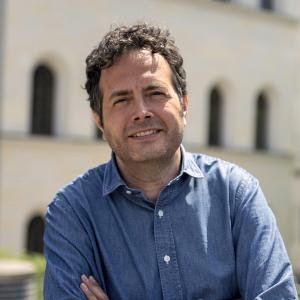“Intellectual work is a social process”
6 Jul 2023
Since the fall of last year, Carlos Spoerhase has occupied the Chair of Modern German Literature with a focus on 18th and 19th century literature.
6 Jul 2023
Since the fall of last year, Carlos Spoerhase has occupied the Chair of Modern German Literature with a focus on 18th and 19th century literature.

© LMU
Professor Carlos Spoerhase is interested in fundamental, nuts-and-bolts questions concerning literature and literary production. For example, he studies the question of literary format and its influence on the form and content of texts. “We can observe in the 19th century how narrative texts changed according to the format in which they were presented,” explains Spoerhase. “Adalbert Stifter, for instance, published his stories in journals for financial reasons and then reworked them for publication in book form at a later date – sometimes with substantial alterations of style, syntax, and structure.” Thus, the material format in which literature circulates determines not only its outer appearance, but also the text itself.
Spoerhase notes that this phenomenon is not limited to the production of literary texts: “I’ve tried to reconstruct how humanities scholars treat subjects in a very format-specific manner,” says the literary scholar. Looking at the practice of the renowned literary scholar, critic, and essayist Peter Szondi, for example, Spoerhase was able to demonstrate how in the process of reworking his habilitation lecture first into a paper, then into an essay, and finally into a volume of essays, Szondi made quite substantial changes along the way – depending on the publication in which the text was to appear. “He had the particular audience in mind. When a scientific text is to appear in a newspaper, for example, then it must be adapted to the reading habits of the target audience.”
This is another important aspect of Spoerhase’s research, that literature production and the humanities are highly social activities, even if the stereotype of the solitary intellectual at a desk surrounded by bookshelves is regularly trotted out by the media to represent writers and scholars at work. In fact, there are numerous people involved in the creation process: “There are assistants who do preliminary work; there are family members, colleagues, or students who provide valuable input,” emphasizes Spoerhase, whose freshly published book Geistesarbeit – eine Praxeologie der Geisteswissenschaften [the title translates as Intellectual Work – A Praxeology of the Humanities], which he co-authored with his colleague Steffen Martus, deals precisely with this subject.
Furthermore, the question “Who will actually read the thing?” places the anticipation of future readership at the beginning of every publication project.
Having studied and completed a doctorate at Humboldt University (HU) in Berlin, Carlos Spoerhase worked as a research fellow at Kiel University and HU. He was a visiting fellow at various institutions, including King’s College in London and Princeton University. The latter stay gave rise to a summer seminar instigated by Spoerhase and Professor Joel B. Lande from Princeton, which was held for the first time at LMU this June. Doctoral researchers and professors from prestigious universities around the world came to Munich to discuss collaborative processes in literature production and literary studies.
Before coming to LMU, Spoerhase was a professor in Mainz and then spent five years as a professor at Bielefeld University. At Bielefeld, he carried out research into the Nobel Prize for Literature within a subproject of the Collaborative Research Center “Practices of comparisons: Ordering and changing the world.” Spoerhase explains: “I’m interested here in the processes that rapidly, almost synchronously generate global attention for the recipient, and in how quickly translations of the works are produced in multiple languages, thus creating a global class of authors.” He plans to further pursue this topic at LMU.
I’m trying to work out how authors write when they know they’re being watched but still want to reach an audience with politically sensitive messagesProfessor Carlos Spoerhase
Carlos Spoerhase has recently turned his scholarly attention to writing under conditions of censorship. His main focus is on the 19th century, where rather draconian censorship measures were sometimes implemented as the conservative values of political restoration gained the upper hand. “I’m trying to work out how authors write when they know they’re being watched but still want to reach an audience with politically sensitive messages.” In particular, he wants to study the recipients, looking at questions such as how they decode hidden messages. “We’re currently researching suitable archives, such as correspondence, contemporary literary criticism, and the reports of newspaper editors, to discover insights into how texts could be decoded.
In this context, the literary scholar was successful recently with an application for a subproject within the Collaborative Research Center “Cultures of Vigilance” at LMU’s Historical Seminar. In general, he values the wide range of opportunities for interdisciplinary work that Munich offers – and this was one of the draws that took him to LMU in the first place.